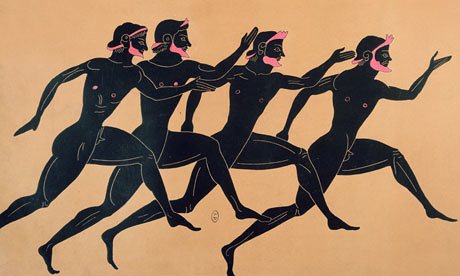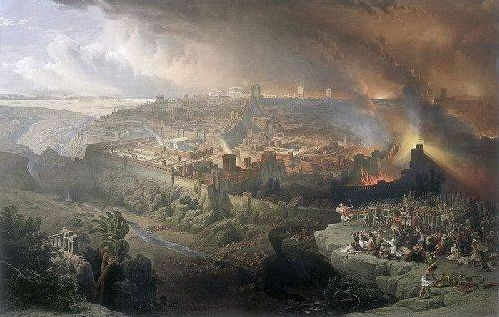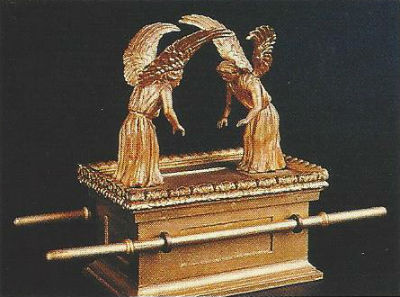Hebrews 12 – Looking Into Eternity
By Neil Earle
 Running the race before us was a familiar feature of First Century athletes.
Running the race before us was a familiar feature of First Century athletes.One of the great things about the Biblical revelation is how fast it can cover great swaths of time and space. Hebrews 12 is very much in that tradition. Here St. Paul begins to wrap up his appeal to Jewish Christians not to give up the Christian life. He uses one of his favorite word pictures – winning a race with an immense crowd of witnesses looking on.
Or in the words of the Living Bible: “Since we have such a huge crowd of men of faith watching us from the grandstands, let us strip off anything that holds us back…”
“Don’t go back”
The fact that in verse 4 he seems to refer to Jesus sweating great drops of blood in his pre-crucifixion mental agony at Gethsemane, indicates that the those close-clinging sins of verse 1 describe the opponents of the Church. It quite possibly refers to pressure to abandon the Faith in that hothouse atmosphere of Jerusalem in the 60s AD when tensions with the hated Romans were about to spill over into the doomed and disastrous Jewish revolt on 66-73 AD. Already, in year 62, during a change in Roman governorships, the priestly class used the occasion to execute James, church leader in Jerusalem, by throwing him from the pillar of the temple.
Thus St. Paul’s message all along: Regardless of the kind of pressure you are under, don’t turn back to the customs and rituals of the Jewish law. All these aspects of Old Covenant religion were limited in time and scope. They are obsolete and ready to pass away (Hebrews 8:13).
 Paul's warnings to the Hebrews about the end of the old covenant system were tragically fulfilled with the Roman destruction of the temple in 70 AD.
Paul's warnings to the Hebrews about the end of the old covenant system were tragically fulfilled with the Roman destruction of the temple in 70 AD.They certainly came to an abrupt stop in 70 AD when the Roman armies under Titus totally sacked and plundered the Tempe at Jerusalem and leveled the massive walls in which the Jewish rebels had trusted.
In the face of this gathering storm, Paul sets forth in Hebrews 12 his consistent theme – the supremacy and superiority of Jesus as the “author and finisher” of the Christian faith.
“Led to Repentance”
We sometimes think we have sought out God by ourselves and engineered our own repentance. But this is the opposite of the way things work, though it is normal to think like this on our limited human level. The key to our conversion is what Paul references in verse 15, “the grace of God,” and it is that grace going before us and enwrapping us that brings us to the Father as wandering children now restored to full relationship with him. St Augustine’s high-powered term for this was the “pre-venient grace” of God, i.e. his love going before us to effect our reconciliation to God. It may look like we ourselves are taking the lead but it is in actual fact “the goodness of God leading us to repentance.” God’s grace--mediated through Jesus and the Holy Spirit – gets us going and keeps us going till the end of our journey.
This is all the more reason for Christians to submit to God’s intervention in their lives even though at times it can seem like we are being disciplined. “Let God train you.” The Living Bible says, “for it is what any loving father does for his children” (verse 7).
We are called to a life of peace and holiness but…we all fall short (12:14). Therefore we have to persevere like a marathon runner – the “race” in Hebrews 12:1 is “agon” in the Greek showing the striving we have to endure. Let us run and not shrink back to jettison our salvation. The writer cites Jacob’s brother Esau who is famous for giving up his blessing and his birthright. This is a strong warning for all of us as the Hebrews letter tends to lay it on the line on many occasions. This is a book of biblical realism for all of us – for the writer and the situation the Jewish Christians found themselves in.
But the reward for persevering, even agonizing through our struggles, is truly out of this world. It brings to bear matters relating to eternity in the shadowy (at least to us) heavenly realms.
 The ark of the covenant on which the High Priest offered animal's blood to atone for Israel's sins was only a shadow of the greater realities depicted by the writer of Hebrews.
The ark of the covenant on which the High Priest offered animal's blood to atone for Israel's sins was only a shadow of the greater realities depicted by the writer of Hebrews.The Riveting Contrast
In Hebrews 12:18-24 Paul draws a stark contrast between the Old Covenant revelation with its scary and intimidating scene before Mt. Sinai and the heavenly Jerusalem Paul has already alluded to in Hebrews 11:16.
Now he paints the picture of what the Christian can expect as he passes from this earthly state, and describes it in at least several factors:
1. We have come to Mt. Zion above, the city of the living God, the heavenly Jerusalem. Other Bible writers have alluded to this and the cardinal point here is that our future is to dwell in a city, “the perfect abode of the people of God” (Guthrie) and a life of relationships which begins in the here and now in terms of “brotherly love.” Mt. Zion (meaning “high eminence”) was King David’s original city and it is here symbolic of what follows – the heavenly Jerusalem, what Revelation 21 calls the New Jerusalem. Jerusalem of old had two peaks, Mt. Zion and the temple mount, symbolizing Jesus in his dual role as priest and king. Now he has unified them both “for God was pleased to reconcile to himself all things” – earth and heaven, angels and humans who have passed on to their resting place (Colossians 1:19-20).
2. We have come to innumerable angels which shows God is not a Monad, living in the kind of splendid isolation to which some religions would consign Him. No, says Leon Morris, rather “the city is no static affair; it is the city of a vital living dynamic Being who is doing things.” The NIV translation of the Bible reads it as “angels in joyful assembly” – in other words there is a celebration going on. It is the endless worship service Revelation describes led by mighty angelic beings who do not cease day nor night singing “Holy, Holy, Holy, Lord God Almighty” (Revelation 4:8).
3. We are also inducted into the church of the firstborn, whose names are written in heaven. Jesus said his disciples names were written in heaven (Luke 10:20). The Puritan scholar John Owen wrote of believers who pass into that glorious state saying “by their adoption they are entitled to all that God has provided, that Christ has purchased, including his whole inheritance of grace and glory…fellow heirs with Christ, heirs of God” (Owen, Hebrews, page 254).
4. We meet God the Judge of all. As Owen said: “This may not seem to be a privilege, for everyone has to appear before God’s judgment seat. But it is one thing to be brought before a judge to be tried and sentenced as a criminal, and another thing to have favorable access to him whenever you wish. This is the access that is intended here.” Well put!
 Christians trust in God's mighty hand to make all things right both in heaven and on earth. (Basil Wolverton artwork)
Christians trust in God's mighty hand to make all things right both in heaven and on earth. (Basil Wolverton artwork)5. Next we meet or reengage with “the spirits of just men made perfect.” As Morris says, “they have become just because of what Christ has done for them.” Perfection in the New Testament usually refers to a mature state, an individual fulfilling the purpose for which he or she was designed. For example, Hebrews 5:8-9 shows that Jesus became perfect through obedience and suffering. He had never sinned but he had to complete the course the Father had laid out before him. As the God-man He thus became our Mediator, which is the very next thought. That these spirits are the righteous ones in the heavenly places is succinctly described by John Owen: “These sprits are the souls of people who have departed. Spirits are that essential part of our nature that subsists in a separate state from the body.”
The New Testament tends to use soul and spirit interchangeably. Thus Mary exclaims to the angel at the announcement of her pregnancy, “My soul glorifies the Lord and my spirit rejoices in God my savior” (Luke 1:47). We have the thirst for eternity inside of us through our human spirit which presses us for something beyond this earthly realm (Ecclesiastes 3:11). We have a yearning for something beyond this mundane world, a yearning for heaven however our human nature disguises it. And one day we will achieve it. It is the Rest promised to the martyred saints in Revelation 6. They are given white robes as symbolic of their graduation to eternal life but their real reward comes at the resurrection of the just when the spirit and the body are united once again when the Lord returns from heaven. Dazzling stuff!
6. The Mediator we come to is of course our older brother Jesus Christ (Hebrews 2:11). It is by being joined to Jesus that our dearly departed have achieved perfection (1 Corinthians 6:17; Ephesians 2:21). Hs blood is better than that even that of righteous Abel because Abel’s called out for vengeance but Jesus blood cries out for mercy and forgiveness. Donald Guthrie adds: “The blood speaks of deeper things than itself because it proclaims a new way of access to God.”
All through this wonderful book, Paul has been showing how the blood of bulls and calves – even though sprinkled on the mercy seat inside the tabernacle – could not truly justify or cancel out our sins. Jesus’ blood sacrifice can and does. By his stripes we are healed and through his intercession for us on the cross and every day as our eternal High Priest we have a chance to live forever, to be taken to the heavenly places, to await what God has for us there (Ephesians 2:8).
All the great saints of the church knew this and were convinced of it. Many have that confidence today. Are you one of them?
(NKJV cited except where otherwise noted.)